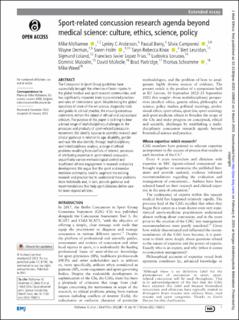| dc.contributor.author | McNamee, Mike | |
| dc.contributor.author | Anderson, Lynley C. | |
| dc.contributor.author | Borry, Pascal | |
| dc.contributor.author | Camporesi, Silvia | |
| dc.contributor.author | Derman, Wayne | |
| dc.contributor.author | Holm, Søren | |
| dc.contributor.author | Knox, Taryn Rebecca | |
| dc.contributor.author | Leuridan, Bert | |
| dc.contributor.author | Loland, Sigmund | |
| dc.contributor.author | Lorusso, Ludovica | |
| dc.contributor.author | Malcolm, Dominic | |
| dc.contributor.author | McArdle, David | |
| dc.contributor.author | Partridge, Brad | |
| dc.contributor.author | Schramme, Thomas | |
| dc.contributor.author | Frias, Francisco Javier Lopez | |
| dc.contributor.author | Weed, Mike | |
| dc.date.accessioned | 2024-02-09T11:43:52Z | |
| dc.date.available | 2024-02-09T11:43:52Z | |
| dc.date.created | 2023-04-27T13:18:20Z | |
| dc.date.issued | 2023 | |
| dc.identifier.citation | Journal of Medical Ethics. 2023, Artikkel 108812. | en_US |
| dc.identifier.issn | 0306-6800 | |
| dc.identifier.uri | https://hdl.handle.net/11250/3116595 | |
| dc.description | This is an open access article distributed in accordance with the Creative Commons Attribution Non Commercial (CC BY-NC 4.0) license, which permits others to distribute, remix, adapt, build upon this work non-commercially, and license their derivative works on different terms, provided the original work is properly cited, appropriate credit is given, any changes made indicated, and the use is non-commercial. | en_US |
| dc.description.abstract | The Concussion in Sport Group guidelines have successfully brought the attention of brain injuries to the global medical and sport research communities, and has significantly impacted brain injury-related practices and rules of international sport. Despite being the global repository of state-of-the-art science, diagnostic tools and guides to clinical practice, the ensuing consensus statements remain the object of ethical and sociocultural criticism. The purpose of this paper is to bring to bear a broad range of multidisciplinary challenges to the processes and products of sport-related concussion movement. We identify lacunae in scientific research and clinical guidance in relation to age, disability, gender and race. We also identify, through multidisciplinary and interdisciplinary analysis, a range of ethical problems resulting from conflicts of interest, processes of attributing expertise in sport-related concussion, unjustifiably narrow methodological control and insufficient athlete engagement in research and policy development. We argue that the sport and exercise medicine community need to augment the existing research and practice foci to understand these problems more holistically and, in turn, provide guidance and recommendations that help sport clinicians better care for brain-injured athletes. | en_US |
| dc.language.iso | eng | en_US |
| dc.subject | cultural diversity | en_US |
| dc.subject | decision making | en_US |
| dc.subject | ethics | en_US |
| dc.subject | medical ethics | en_US |
| dc.subject | research ethics | en_US |
| dc.title | Sport-related concussion research agenda beyond medical science: Culture, ethics, science, policy | en_US |
| dc.type | Peer reviewed | en_US |
| dc.type | Journal article | en_US |
| dc.description.version | publishedVersion | en_US |
| dc.rights.holder | © Author(s) (or their employer(s)) 2023 | en_US |
| dc.source.pagenumber | 9 | en_US |
| dc.source.journal | Journal of Medical Ethics | en_US |
| dc.identifier.doi | 10.1136/jme-2022-108812 | |
| dc.identifier.cristin | 2143826 | |
| dc.description.localcode | Institutt for idrett og samfunnsvitenskap / Department of Sport and Social Sciences | en_US |
| dc.source.articlenumber | 108812 | en_US |
| cristin.ispublished | true | |
| cristin.fulltext | original | |
| cristin.qualitycode | 2 | |
